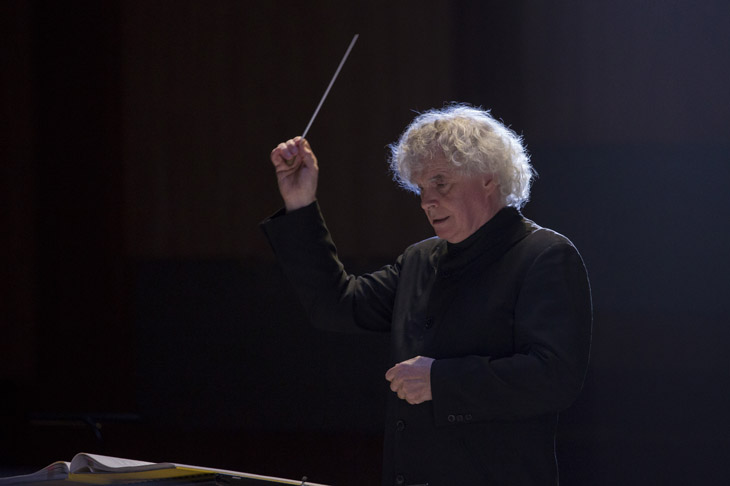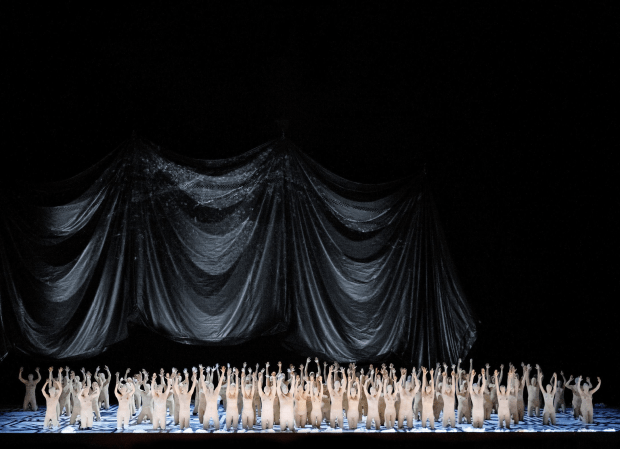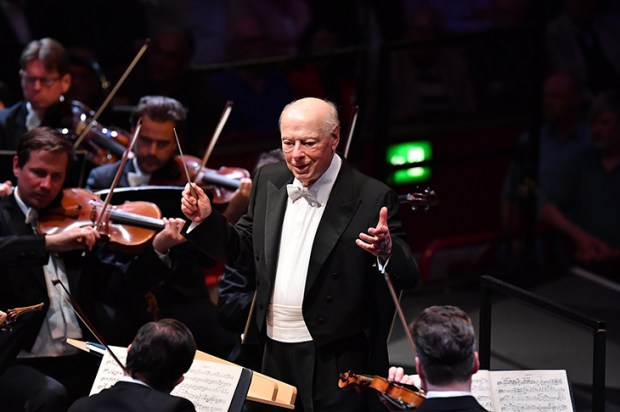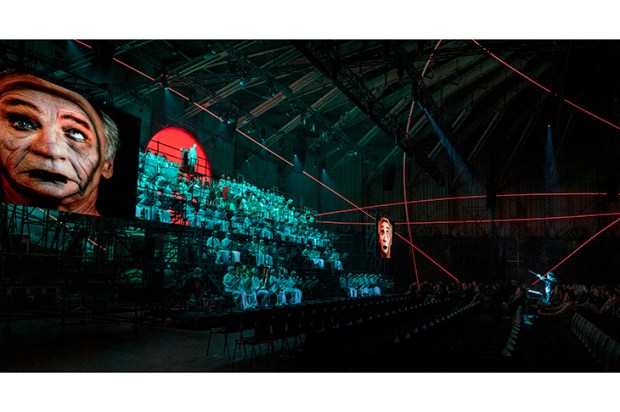I was going to start with a little moan. About the shouty marketing, the digital diarrhoea, the sycophantic drivel, which, like a bad smell, hovered over Simon Rattle’s ten-day coronation. But then came the most amazing Rite of Spring I’ve ever heard and to moan suddenly seemed criminal.
No masterpiece is harder to pull off than the Rite. So often it deflates midway and never regains its shape. Rattle made his name with the piece when he was at the City of Birmingham Symphony Orchestra, taming the brute, slowing it down, prising open its interior, allowing us to inspect its fangs, look straight down its snappy gob.
Here, the beast was unleashed. Rabid brass, uncontrollable winds, strings scything through the rabble behind. Key to the pungency was the bite of the percussion, allowed to go to such extremes my eyes began to water. The LSO can come across as a bit slick. Last Sunday they were monstrous. Before letting loose their inner animal, they delivered an invigorating Firebird and a Petrushka that sounded (in the best possible way) like they’d passed the vodka round early.
Still, I could have done without the big screens, the speeches, the Lord Mayor explaining how historic everything was. Left to our own devices, I dare say we could have figured this out ourselves. The Barbican website was a mess:
This is Simon Rattle…This is it…This is Helen Grime and Thomas Adès, Oliver Knussen and Elgar. This is Sir Harrison Birtwistle and Sir Simon Rattle…This is the LSO. This is Christian Tetzlaff. This is Sir Simon Rattle.
U ok hon?
‘This is Rattle’ also ingeniously offered a series of concerts without Rattle. Stuffed with work by Thomas Adès, Harrison Birtwistle, Oliver Knussen, Helen Grimes and others, these became a chance to do an MOT on the state of new British music, some of which seems destined for the knacker’s yard.
I kept thinking about the two cocky caryatids that prop up one of the architectural wonders of London that you can see straight across from the house in which Adès grew up. Lubetkin’s Highpoint, a stack of calm geometry, is a cool classic and a lesson in the importance of impurity. At the entrance stand the classicallovelies, unashamed, bizarre, brilliant.
The same spirit is there in Adès’s early orchestral tone poem Asyla. That embrace of vulgarity, excess, wrongness. It’s an instinct foreign to his tastefully correct compatriots, who write like they think it impolite to surprise.
It meant the attempt to canonise three new British works in the opening concert just served to show everyone up. The only piece that deserved its place was Asyla, whose ideas remain as vivid as ever. Pounding nightclubs; rainy idylls; echoey temples. The writing is fastidious. The score has instructions for a ‘bag full of metal knives and forks (struck flat)’.
Birtwistle is usually a match for Adès, but he’s not very Birtwistley in his Violin Concerto, which scurries around in life-sapping middle-register. Birtwistle is at his best in the shadows. Shine a torch on his murky world and it becomes a bit too clear how dry a lot of the writing is. Knussen’s Third Symphony was classic Knussen: colourful, zippy, with three glinting treasures — guitar, harp and celeste — and a serious ADHD problem that was exhausting. The short straw went to Grime who was charged with writing the fanfare. Enter five minutes of fake energy and false smiles.
Elsewhere, at Milton Court, there were more attempts (to half-empty halls) to generate excitement for new British music. The night with the excellent Britten Sinfonia, stitching together a whole set of works that feed off baroque techniques, was beautifully played and cleverly curated by Grime — but only Adès’s suite from The Tempest dazzled. Adès himself curated a night. Two gems emerged: Judith Weir’s The Alps, a typically wry song, and Gyorgy Kurtag’s magically microtonal Eletut.
All very pleasant, nothing very life-changing. If you restrict yourself to the safe, samey composers of the Faber publishing house and its allies, your life will not be changed. A shock will come when audiences finally realise what the younger generation of composers are up to, very few of whom were at these gigs, or take their lead from Faber.
Many were instead at Cafe OTO, absorbing the UK première of a blistering new opera, It’s All True, from the New York experimentalists Object Collection. Formally the piece resembles a kebab in its welding together of offcuts — the sloppy beginnings and intense endings of the rowdy stage shows of the hardcore punk band Fugazi. However red-faced and Trumpian the resultant barrage of sweary rants and noisy swordplay between electric guitars might sound, it’s surprisingly subtle in its direction of travel and touching in its nostalgia and even rather beautiful.
The OTO performance wasn’t as clear or suffocating as its world première at Borealis Festival. But London won’t forget it in a hurry. Not pleasant, pretty life-changing.
Got something to add? Join the discussion and comment below.
Get 10 issues for just $10
Subscribe to The Spectator Australia today for the next 10 magazine issues, plus full online access, for just $10.
You might disagree with half of it, but you’ll enjoy reading all of it. Try your first month for free, then just $2 a week for the remainder of your first year.















Comments
Don't miss out
Join the conversation with other Spectator Australia readers. Subscribe to leave a comment.
SUBSCRIBEAlready a subscriber? Log in